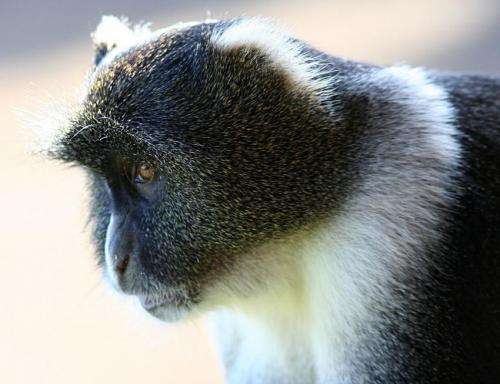July 25, 2014 weblog
Monkeys fear big cats less, eat more, with humans around

Some Monkeys in South Africa have been found to regard field scientists as human shields against predators and why not if the alternative is death by leopard? The researchers found the monkeys felt far safer when humans were nearby. It has to do with a life marked by predator fear. The study, appearing in the Oxford journal, Behavioral Ecology, was conducted by researchers from the UK, the Netherlands and South Africa.
"Human observers impact habituated samango monkeys' perceived landscape of fear," by Katarzyna Nowak, Aliza le Roux, Shane A. Richards, found that samango monkeys feel a lot safer from land predators when they know humans are close by. "We tested the magnitude of the 'human shield effect' experimentally on two groups of samango monkeys, Cercopithecus mitis erythrarcus, at a site with high natural predator density and no human hunting pressure," they wrote.
Jeremy Hance, writing earlier this week in Mongabay, an environmental science and conservation news site, reported on their work: "Studying samango monkeys in the Soutpansberg Mountains of South Africa, researchers were curious about how these monkeys, which have long been habituated to scientists, may change behavior depending on the presence or absence of humans." He explained how the team placed feeding buckets for the monkeys at different tree heights; the higher up, the less risk of predators attacking from the ground.
The paper's lead author, Dr. Katarzyna Nowak, Department of Anthropology, Durham University, told The Independent that when she started following the monkeys they showed a 'vertical axis of fear.' In their study, the authors wrote, "The density of food remaining in a patch when a forager leaves—were greatest at ground level (0.1 m) relative to three tree canopy levels (2.5, 5, and 7.5 m), highlighting a strong vertical axis of fear."
"The amount of food monkeys depleted from buckets over the course of the experiment varied with height, with the most food left uneaten at ground level, where there is a risk of predation by leopards and caracals." Nowak said in The Independent.
Yet things changed when the monkeys knew that humans were around. These samango monkeys were happier eating on the ground if they were aware that humans were nearby. Hance in Mongabay wrote that "Measuring how much food was left over in the buckets when people were watching versus when people were absent, Nowak and her team found that monkey banquets lasted far longer with people nearby."
"Our results," the authors wrote, "suggest that human observers lower monkeys' perceived risk of terrestrial predators and, thereby, affect their foraging decisions at or near ground level. These results have significant implications for future studies of responses to predation risk based on habituation and observational methods."
Commented Hance: This doesn't mean all monkey species and groups would also act similarly, using humans as shields against predators. "In fact, many monkeys are hunted by people and will treat researchers as predators themselves until they learn the difference between those that hunt them and those that don't. In other words, human presence always complicates things."
How complicated? We return to Nowak, as reported in The Independent, where she said that, for animals, the observer effect isn't always as beneficial. According to studies conducted in Gombe National Park, carnivorous chimpanzees took advantage of the fact that their prey, red colobus monkeys, were panicked by scientists, leveraging that to flush out and kill the monkeys.
More information: Behavioral Ecology (2014) DOI: 10.1093/beheco/aru110
Journal information: Behavioral Ecology
© 2014 Phys.org




















